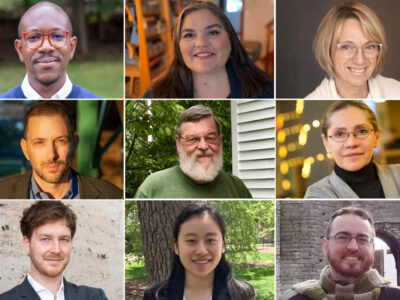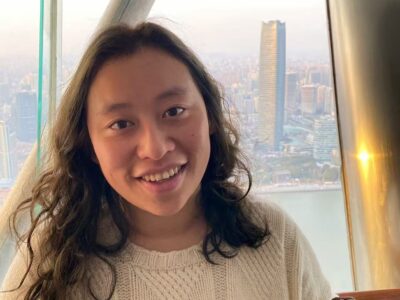The Undergraduate Program in Sustainable Development is proud to celebrate the hard work and outstanding dedication of its recent graduates. Sustainable Development Departmental Honors are awarded to students with a grade point average of at least 3.7 in their major courses and at least a B+ in both courses of the senior thesis seminar. Six students from the class of 2022 earned Departmental Honors, and two received the Stuart Gaffin Award for Leadership and Engagement. We caught up with them to learn about their post-graduation plans, their understanding of sustainability, and their advice to current students.
Lily Friedland (Departmental Honors)

I plan to take a year off to travel, volunteer, and hike the Appalachian Trail before applying to master’s programs in sustainable urban design, planning, transportation and/or architecture.
How did the program shape your understanding of sustainability?
The sustainable development program allowed me the flexibility to discover the limitless fields of sustainability work and the field I felt the most passionate about personally. A lot of undergraduate programs focus on environmental physical sciences or limit the scope of environmental social science to policy or economics. These are all essential fields to the study of sustainability, but Columbia’s program allowed me the flexibility to discover other fields, like sustainable urban design and planning. Sustainability can be applied to many fields beyond what we currently know, and the SDEV program at Columbia allows students to discover and invent these connections that will most certainly be a part of our future.
What advice would you give to current students in the program?
My advice for students is to never stop searching for what makes them excited to learn and devote their studies (and possible future career) to a sustainable future. During my time at Columbia, I trusted a gut feeling that told me that I was supposed to devote my career to sustainable development, but many of the more well-known careers in the field never jumped out at me. It was only during the pandemic when I accidentally lived on an active green growth redevelopment site that I discovered my purpose in the sustainability field: sustainable urban design and transportation. We are fortunate to be part of a growing field made up of foundational green jobs like those in government as well as those in their infancy. Your unique purpose is out there and we need your skills to make a difference!
Lauren Apollaro (Departmental Honors)

At the end of the summer, I will be joining California Environmental Associates Consulting as a research associate in San Francisco. I couldn’t be more excited for the opportunity to engage with a diverse array of stakeholders regarding our most pressing environmental issues — and also to explore a new city!
How did the program shape your understanding of sustainability?
Before coming to Columbia, I had very limited knowledge regarding sustainability. In fact, Intro to Sustainable Development with Professor Smerdon was my first exposure to the field. At first, the concept seemed simple, but my understanding of sustainability has grown as I worked my way through this program. Through core program classes like the Capstone Workshop and electives like Fundamentals of Global Health, I began to appreciate the nuance and intricacy that the study of sustainable development demands. With every course, my understanding of sustainability evolved to become a complex web of the relationships between environmental, social, and economic stakeholders — each at differing scales and with different perspectives and goals.
What advice would you give to current students in the program?
Don’t be afraid to reach out to upperclassmen! This program has such a wide variety of course offerings and interest areas, and my upperclassmen Sus Dev peers were instrumental in helping me decide which classes fit best with my goals and interests. You are surrounded by awesome, capable, brilliant individuals, so take advantage. And if you don’t know any upperclassmen personally, feel free to reach out — I’m happy to help!
Ben Dahan (Departmental Honors)

Since graduating, I’ve been completing a summer-long service term through Americorps, working with the Center for Rural Livelihoods in Cottage Grove, Oregon. The main through-line in the work we’ve been doing — which runs the gamut from invasive species removal, fuel loads reduction, natural building and restoration forestry — is that my hands get plenty dirty! In the future, I plan to work in climate change adaptation in my home regions of California and North Africa.
How did the program shape your understanding of sustainability?
As a foundation of the program, you learn about the ever-evolving definition of sustainability, put forward in milestones like the Brundtland Report [which developed guiding principles for sustainable development]. You learn how to see the many problems brought about by developing unsustainably through their political and natural dimensions. What I found most formative, though, was the diversity within sustainable development — that “sustainability” itself is a big tent that holds the great variety of passions of my fellow students within the major! Personally, through conversations with professors and peers, I came away with the idea of living sustainably by adapting in concurrence with changing systems.
What advice would you give to current students in the program?
The secret to making the most of the program is: to not confine yourself to it! Columbia is a hub of sustainability of all kinds, touching diverse disciplines and departments. I’ve been to an intimate roundtable with the energy minister of Colombia through the Center for Global Energy Policy, rubbed elbows with climate change officials within the Defense Department through the School of International and Public Affairs and the Saltzman Institute for War and Peace Studies, and was blown away by a discussion on the framing of the “climate crisis” put on by the Middle East Institute. Subscribe to research center newsletters. Reach out to professors and alumni (including / especially me!) doing cool things. Engage with the issues that drew you to Sustainable Development in the first place, and explore what you could never have expected to find within it!
Isadora Muszkat (Departmental Honors)

What are your plans having now graduated from the program?
Right now I am working with the Greater New Haven Clean Cities Coalition as a summer intern, developing a project to help bus and truck fleets reduce their emissions and increase their use of alternative fuels. I am very interested in sustainable consulting and ESG metrics and ratings and I hope to go into this field in the future.
How did the program shape your understanding of sustainability?
I remember the first time someone asked me how I would define sustainability or sustainable development. I realized then that I had never tried to put into words what was, to me, almost an emotional understanding of the term. The program at Columbia helped me craft a more rational and practical understanding of sustainable development while making me realize how broad and complex the topic of sustainability is. As a program, the sustainable development major is as holistic as the idea and approaches to sustainable development itself. At first, I was worried about being totally overwhelmed by science classes (which were very challenging, I’m not gonna lie), but the degree is much more than that. I had classes on economics, data analysis, food production, law, and social sciences through the lenses of sustainability, and that really gave me a more complete and holistic understanding of sustainability.
What advice would you give to current students in the program?
Work together. Make friends in class and find people you can work with. Being able to teach and learn from your peers will make your experience much more fun and your life easier. Don’t let the competitive atmosphere at Columbia prevent you from studying together and helping each other. At the end of the day, the idea of sustainable development itself requires that we all work together towards a common goal.
Nick Kime (Departmental Honors and Stuart Gaffin Award)

What are your plans having now graduated from the program?
I’ve just moved to Washington, D.C. and started work at the Consumer Financial Protection Bureau. I’ll be here for at least two years as a fellow, rotating through a couple of different offices within the bureau. My first assignment is with the Office of Supervision Policy, the office that organizes how the bureau supervises financial institutions to make sure they comply with federal financial regulations. Most people who hear that I’m working at the CFPB are a little surprised considering that it doesn’t directly relate to environmental issues like some other common jobs for graduates with a sustainable development degree. I think one valuable takeaway from my undergraduate education, though, was the idea that sustainability, in theory, can and should inform all aspects of society and, in particular, governance. Stakeholder models intrinsic to sustainable development are incredibly valuable to government agencies like the CFPB, whose express purpose is to listen to consumer complaints and analyze financial data to develop the infrastructure necessary to regulate banks and other financial institutions. That said, I’m looking forward to spending the next couple of years in Washington, and I am not sure where I will end up after!
How did the program shape your understanding of sustainability?
The program did a great job of illustrating the practicable elements of sustainable development — the laws, developments, changes and plans we should and should not be implementing in order to achieve present and future prosperity. It also goes without saying that students of sustainable development are confronted with lots of incredibly sad material. And I think one of the most refreshing things about taking courses in the sustainable development program was its escape from the pessimism that seems to pervade most of our generation, particularly when it comes to environmental issues. I’m not saying climate anxiety isn’t real, but I think the benefits of that kind of atmosphere of optimism definitely shaped how I understand sustainability — that is, at its core is a belief that the Earth and its people are pretty great and worth working to save.
What advice would you give to current students in the program?
I can’t stress enough how valuable it was for me to have taken classes in sustainable development while also concentrating in history. I think that sustainable development gives you a really interesting lens to analyze issues outside of the direct purview of environmental studies. Definitely take classes outside of the major, in different disciplines that you know nothing about. Also, as I hinted at in the previous question, I think that sustainable development is a pretty unique major in that it hinges on its student’s appreciation of the Earth — so appreciate the Earth! Take breaks, go to concerts, explore neighborhoods deep into New York City and try foods you have never heard of before. You’re living in one of the most diverse places in the world, and I think it’s critical for your sustainable development education to take advantage of that.
Jiashi Yang (Departmental Honors)
Jiashi Yang double majored in Sustainable Development and Russian Literature and Culture. She completed a joint senior thesis with the Slavic Languages Department entitled The Sino-Kazakh Energy Relationship: How Sustainable Is It?
Lauren Ritchie (Stuart Gaffin Award)
Lauren received the Stuart Gaffin award for her work with the Earth Institute and the Lamont-Doherty Earth Observatory. Her efforts consistently centered around amplifying efforts in advancing diversity, equity, and inclusion. Lauren’s widespread and impactful work to foster conversations on campus about climate justice, intersectional environmentalism, and climate activism by creating the Columbia Climate Conversations series and other virtual and in-person efforts will leave a lasting impression on the university community and the SDEV program.



